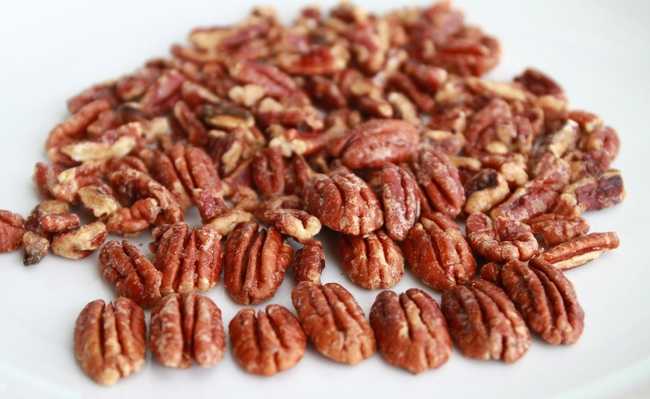Seasonings and their health benefits
Various spices provide health benefits for the whole body

It's always good to have a variety of spices in your pantry, after all, no one wants to live a life without flavor. However, sometimes too much flavor, in addition to disturbing the real taste of food, can mean harmful to health, as occurs when ingesting high amounts of salt (if you want to know tips to reduce salt in your routine, take a look at the article : "18 Simple Tips to Reduce Your Daily Sodium Intake"). And that's why we've added some spices that are widely used in Brazilian kitchens and that provide several benefits for your health. Let's go to the many benefits of spices:
Coriander
Widely used to season fish, coriander contains the flavonoids linalool, pinene and terpene, which aid digestion and have bactericidal and fungicidal properties. Coriander seed is rich in vitamins C, vitamin B complex and calcium.
Coriander contains antioxidants, which are molecules that restrict the oxidation of other molecules in the body and this brings several benefits in different parts of the body, helping to prevent risks to the heart, or to prevent neurological diseases such as Parkinson's and Alzheimer's (to know more about antioxidants, take a look at the article "Antioxidants: what they are and what foods to find them in").
Research shows that coriander leaves have antibacterial and anti-inflammatory properties that improve skin health and help fight diseases such as pinkeye. Coriander is a good source of fiber, so it provides relief for those with gastrointestinal problems.
It is also a source of good cholesterol (HDL) and, because it has linoleic acid, ascorbic acid, stearic acid and palmitic acid in its composition, it reduces bad cholesterol (LDL).
Oregano
Oregano is not only the spice best known for its invaluable contribution to pizza - it has many health benefits. It is, for example, packed with antioxidants that do wonders for our bodies, helping to protect cells from the effects of free radicals.
It is also anti-inflammatory and antibacterial, helping to fight bacteria Helicobacter pylori - responsible for gastric and duodenal ulcers - and balancing the intestinal flora, helping the absorption of important substances for the body.
In tea form, it has an expectorant and antifungal action, being used in the treatment of athlete's foot and candidiasis.
Cinnamon
Cinnamon provides numerous benefits. Most important is aid for pre-diabetics and those suffering from type 2 diabetes, as it reduces glucose concentration and increases insulin sensitivity, increasing the body's ability to ward off diabetes. It is also widely used for those looking to lose weight, as it satisfies hunger, prolongs the feeling of satisfaction and increases the body's metabolism.
Like oregano, it has antioxidants, is anti-inflammatory and antifungal, being used in different homemade recipes.
It is important to emphasize, however, that the ingestion of cinnamon is contraindicated for pregnant women at any stage of pregnancy, lactation or infant feeding.
- Cinnamon: benefits and how to make cinnamon tea
Scallion
Rich in flavonoids, chives are anti-inflammatory and considered one of the most potent natural antibiotics, having been used by the Romans as one of the most popular remedies to treat sore throats. Contains vitamins A, C and E, rich in magnesium, iron and calcium, in addition to regulating blood pressure and reducing stress.
Those tube-shaped leaflets contain bactericidal properties, help control blood pressure, and contain vitamins A and C.
Your recommended daily intake is at least three rods every day. It is suitable for those looking to gain weight, as it is an appetite stimulant.
- Properties of chives and their health benefits
Curry
Curry it is the mixing of several spices together and each mixture can result in different flavors. However, a common denominator of these mixtures is turmeric, which is a great anti-inflammatory. Curcumin, a powerful anti-inflammatory agent, is 50 times more potent than vitamin C. Turmeric, another spice present in curry, decreases joint swelling, especially for those who suffer from arthritis or inflammation in such areas. Regular use of turmeric can help reduce the risk of Alzheimer's disease and dementia. This is due to the power that turmeric has to identify the so-called amyloid plaques that, in excess, interfere with brain synapses.
- What is curry and its benefits
- Learn about the benefits of turmeric, the ground saffron
- Is brushing your teeth with turmeric a good one?
Curry it is rich in antioxidants that can improve the skin's appearance and prevent the negative effects of long-term exposure to pollutants or smoke. Other ingredients present in the curry, like pepper and turmeric, boost the body's immunity because they are rich in vitamins A, C and B6, which help cells fight infections. Its regular intake helps in weight loss, as it has a variety of amino acids and proteins that help burn fat cells.
Rosemary
It has antioxidant and anti-inflammatory components that can improve the immune system and blood circulation. Helps protect the neurological system. Rosemary also contains carnosic acid, an ingredient capable of fighting free radical damage in the brain. According to a study published by Cell Journal, carnosic acid may be useful in protecting against neurodegeneration in the hippocampus. According to scientists from Sanford-Burnham Medical Research Institute, in the US, carnosic acid can also promote better eye health.
And for those who are enemies of mosquitoes, rosemary is also one of the plants that work as a natural repellent. To learn more, take a look at the article: "Six Types of Plants Act as a Natural Insect Repellent."
- Rosemary: benefits and what it is for
Nutmeg
Nutmeg has been used for centuries by oriental culture, and has a substance called myristicin, which acts on brain function, stimulating memory and inhibiting the action of the enzyme that causes Alzheimer's disease. In addition to adding flavor to your food, nutmeg contains minerals such as potassium, calcium, iron and manganese that help keep your immune system strong. It has anti-inflammatory components that, according to research, help to inhibit the growth of tumors and reduce the chance of developing certain types of cancer. If you have insomnia, add half a teaspoon of nutmeg to your hot drink and drink it before bed. This ancient recipe is known for bringing a good night's sleep.
But remember: nutmeg in high doses can be dangerous, causing nausea, diarrhea, hallucinations and, in some cases, even death. Therefore, to enjoy the best form of this type of seasoning, use only small doses when cooking.
cayenne pepper
Cayenne pepper contains capsaicin, a substance that stimulates the body's metabolism, helping to burn calories. It is a known circulatory stimulant and aids in detoxification. It helps control blood pressure and reduces triglyceride levels.
- How To Improve Blood Circulation With Eight Tips
It helps to dissolve fibrin - a substance that promotes the formation of clots - and, when added to meals, fights stomach pain, cramps and gas. If you have constant sore throats, it's also a good home remedy to treat them.
- 18 Sore Throat Remedy Options
Garlic
Garlic is one of the spices that contribute to a longer and healthier life, as it has a component called allicin, which prevents atherosclerosis and coronary obstruction, which reduces cholesterol and blood clots. It has antibacterial properties that treat infections, regulate blood sugar and prevent cancer.
- Ten Benefits of Garlic for Health
- Garlic oil: what is it for and benefits
It helps prevent colds and flu due to its antiviral and antibacterial properties. It contains pyridoxine, or vitamin B6, which helps prevent heart disease, maintains a healthy nervous system and has the added benefit of healthy skin.
bay leaf
Bay leaves have zero cholesterol. They are rich in compounds that help with heart health, reducing the chances of coronary heart disease and keeping the heart active. They are rich in monounsaturated fatty acids and help improve HDL cholesterol (the good one!) and lower LDL cholesterol (the bad one). They are recommended for pregnant women as they help with DNA synthesis. And they help to regulate the menstrual cycle. Recommended during colds and fevers as they help relieve congestion. The best way to ingest the bay leaf is in the form of tea, but if you want to make a heavy meal like feijoada lighter on your stomach, add some bay leaf during its preparation.
Basil
Basil is a seasoning that contains flavonoids that, in addition to several other benefits to the body, as we have already mentioned, help to reduce the action of cholesterol oxidation in the bloodstream, reduce bad cholesterol, control blood glucose and, due to the anti- inflammatory, relieve arthritis pain.
- Flavonoids: what they are and what are their benefits
It has antioxidant, anti-stress properties and is anti-bacterial; helps reduce the stress hormone cortisol. In addition to being a source of vitamin C, it helps to reduce mucus in bronchitis and prevents coughs and sore throats.










